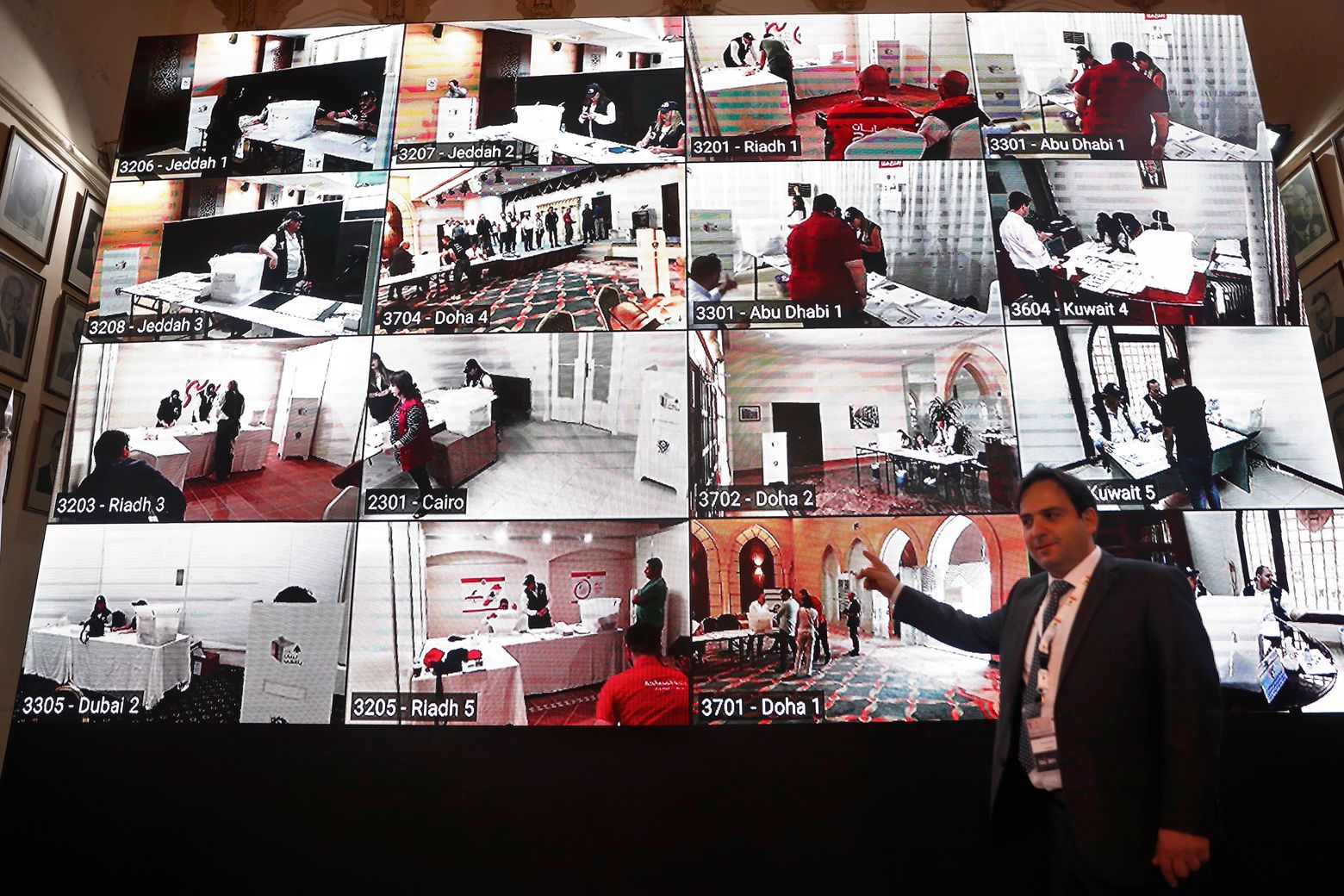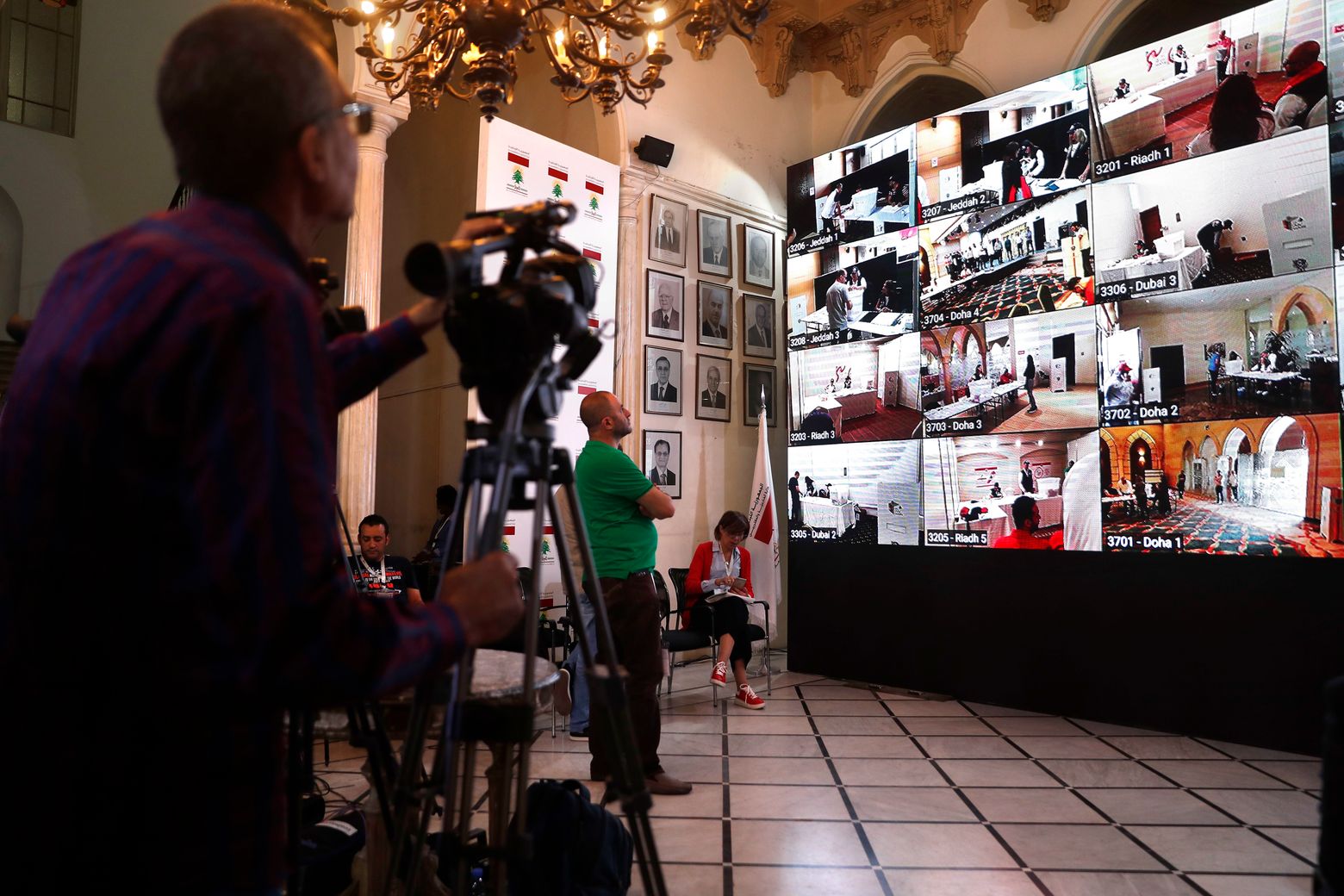

Lebanese communication manager Charbel Matta talks to reporters next to a giant screen that shows voting by Lebanese expatriates in six Arab countries, ahead of parliamentary elections scheduled to be held in Lebanon on… (AP Photo/Hussein Malla

by middleeastmonitor.com Lebanese expatriates in six Arab countries today began casting ballots for parliamentary elections, according to the Foreign Ministry. It is the first time for Lebanese nationals who live overseas to vote in the country’s parliamentary elections. Citizens in the United Arab Emirates, Oman, Qatar, Kuwait, Saudi Arabia and Egypt this morning began casting ballots at their respective embassies. “For the first time in the history of the Lebanese Republic, Lebanese living abroad are able to vote,” Foreign Minister Gebran Bassil told reporters at the ministry’s Beirut headquarters. According to Bassil, 82,970 Lebanese expatriates have already cast ballots. “Expat voter turnout today will be very important,” he said. The second phase of the expatriate vote will be held on Sunday in 30 more countries. The polls will see 917 candidates from a host of political parties compete for 128 seats in Lebanon’s national assembly. Polling will be conducted in Lebanon on 6 May under a new proportional system, which divides the country into 15 separate electoral constituencies.

Fouad Chehab Dandan, Lebanese Ambassador to the UAE, after voting at the Lebanese Embassy. Abdul Rahman/Gulf News
by Bassam Za’za’, Legal and Court Correspondent; Janice Ponce de Leon, elections Dubai: The voter turnout in the UAE for the Lebanese elections — held overseas for the first time on Friday — was the highest in six Arab countries where they were held, a media statement said. Lebanese expatriates flocked to their missions in Abu Dhabi and Dubai on Friday and made history as they cast votes for the first time outside their country, ahead of the May 6 elections. The UAE was one of six Arab countries where overseas voting by Lebanese expats for the parliament was allowed, along with Saudi Arabia, Kuwait, Oman, Qatar, and Egypt. Registered expat voters in Arab countries numbered 12,609.
Lebanese expats in the Americas, Europe, Australia and Africa will cast their votes on Sunday. The last parliamentary elections held on Lebanese soil was in 2009. Foreign Minister Gebran Bassil tweeted that he was “very proud” to witness the first expat voting in the history of the Lebanese republic. Philippe Samaha and his sister Cynthia after voting in Dubai. Antonin Kélian Kallouche/Gulf News “It marks the beginning of a track that will not stop until the return of all Lebanese to their country,” he posted as people followed the voting on a large screen at the foreign ministry. The elections next month in Lebanon are the first in nine years after parliament postponed them several times over security reasons. The house’s term was supposed to expire in 2013 but lawmakers approved several extensions since then, the last one in June for another 11 months. 5,166 registered voters In the UAE, 13 polling centres were open to cater to 5,166 registered voters. Voting centres opened doors at 7am and will remain open until 10pm on Friday.

From left: Naji Kazak, Zeina El Sheikh, with their children Fadi and Lara, after voting in the Lebanese Consulate in Dubai. Antonin Kélian Kallouche/Gulf News
As of 3pm on Friday, Some 1,606 voters had cast their votes at both missions representing 31 per cent of the total roll call, according to the Lebanese Foreign Ministry. Some voters were seen beaming with kids in tow. 13 polling centres in UAE Among them were Naji Kazak and wife Zeina Al Shaikh who wanted to be an example to their son Fadi and daughter Lara. “We brought our kids today because we wanted the whole family to be part of this. We’re making history today,” Zeina, a communications manager, told Gulf News. “It was a bit crowded which really makes my heart happy to see how enthusiastic and happy the Lebanese expats are to come and vote. Honestly, it’s crowded but it’s worth it,” she added. Zeina is hopeful that the elections will bring about change and a better future for her country. “Voting, at least for us, is a national duty. We care because this is our country and we really hope for the best,” she said.
Naji encouraged those who have been advocating for change but have lost faith in the elections to begin the process with themselves by exercising the right to vote. “Even if they have lost faith, there is always an opportunity, a chance. Today is that chance. We have to make that change starting with ourselves. You cannot complain all your life while sitting and doing nothing. At least, if I want to complain, at least I exercised my right. This is our right and we must take advantage of that right,” Naji said. Hassan Ahmad, a resident of Dubai since 1996, could not agree more. “I am an advocate of change and have full trust and confidence in the citizens’ power and right for a change and to change. Hence, I went with my wife to vote in hope for the best of democracy and in hope of seeing newer and fresher faces in the parliament whom I hope would be able and succeed in reshaping the whole political cycle in Lebanon,” he said.

Philippe Samaha and his sister Cynthia after voting in Dubai. Antonin Kélian Kallouche/Gulf News
Also hoping for the best for Lebanon were siblings Cynthia and Philippe Samaha. “It’s amazing because we felt that we are contributing to our country’s future. The change we want is peace, security, financial stability, and everything else so all Lebanese expats can go back to Lebanon,” Cynthia said. Philippe said with a grin: “Our district had a lot of voters. I think our list will be the winning one. We hope for the best.” The voting process was easy and convenient and only took less than five minutes per voter. The waiting time took longer, however, as the queues for some districts were long.
I waited three hours in the sun but I’m here. I used to travel to Beirut to vote before but now I can vote here, which is a good thing.” – Eid Al Riachi | 43-year-old voter
For Rana, a banker and resident of Dubai since 2003, her parents brought her up in a house that respects and believes in democracy and democratic systems. That is why she came early to cast her vote before the rush. “It’s true that this new electoral law isn’t good enough to satisfy and meet our needs as Lebanese citizens but it has come as a change after decades of voting via the same old laws. We are fed up of seeing the same parliamentarians since the 1970s. I’m hopeful that this new law would make a breakthrough, though, not groundbreaking one,” she said. Roland G., a businessman, believes his vote will “help in introducing some kind of change in the Lebanese politics”. After the voting, the ballots will be sealed and sent to the Lebanese Central Bank. They will only be opened and counted at the end of the official voting day on May 6. — With inputs from AP
Election violations reports
by naharnet –– Several electoral violations were reported as the voting of Lebanese expats got underway in six Arab countries on Friday. A monitor from the Lebanese Association for Democratic Elections (LADE) said that in the Saudi city of Jeddah, officials thwarted attempts by some voters to use cellphones behind voting booths to take footage of their ballots during the voting process. “The aforementioned voters decided not to cast their ballots after their attempts were foiled,” the monitor said, noting that cellphones were later taken away from all voters participating in the electoral process. In Oman’s Muscat, “a security camera was present behind the voting booth,” the LADE monitor said. “The ministry was informed and the issue was resolved,” she added. LBCI television meanwhile reported that in Dubai, some voters objected after their ballot envelopes were not sealed. The TV network said the official in charge of the polling station told the objecting voters that the new electoral law does not stipulate the sealing of envelopes and that a box containing all envelopes would be sealed with red wax ahead of being sent to Lebanon
Turnout
by Naharnet — The overall voter turnout was at 48.11% at 5:25 pm Beirut time according to the National News Agency. Voters elsewhere in the world will vote on Sunday, a week before the May 6 polling in Lebanon, which has not renewed its parliament since 2009. But of the estimated one million-plus Lebanese nationals scattered across the globe, of which around two thirds qualify to vote, a total of only 82,900 people have registered. Akram Khater, director of a center for Lebanese diaspora studies at North Carolina State University, says promotion for the new initiative has been limited. “This is a new experiment that has been poorly publicized, and many are not sure of the mechanism, the implications of their vote,” he said. Others may be disillusioned after a series of political crises that notably saw the last parliament extend its own mandate three times. “Many are reluctant to participate in what is widely regarded as rigged elections which will only bring back the same crop of politicians from the same parties,” Khater said. The numbers of voters registered outside Lebanon is a fraction of the 3.7 million eligible voters at home. – Massive diaspora – But for a first try, “it’s a satisfactory” number, a diplomat told AFP.
Voters will head to 116 polling stations in Lebanese embassies and consulates in 39 countries, and their votes will be shipped to Beirut in the diplomatic pouch. They will then be stored at the Central Bank after being sorted into electoral districts, and dispatched to each of these for counting on May 6. The government has said polling stations abroad will be monitored by security cameras. With registration relatively low, the political weight of Lebanon’s diaspora vote this year will be “symbolic”, elections consultant Said Sanadiki said.



